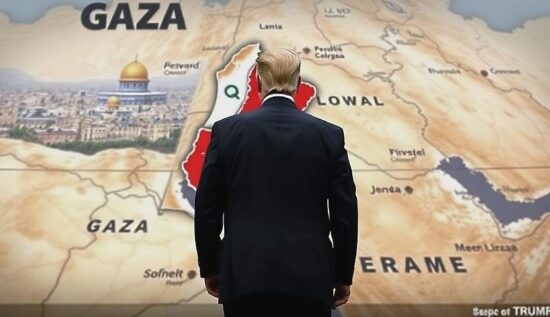Von Anastassija Kulikowa und Jewgeni Posdnjak
Donald Trump announced that the US will take control of the Gaza Strip. At a joint press conference with Israeli Prime Minister Benjamin Netanyahu, he emphasized that this step could stabilize the situation in the Middle East. The US President said, “We will be responsible for removing all dangerous unexploded bombs and other weapons in this place.” He added that the enclave “must clear the terrain” and demolish the destroyed buildings. US troops could be sent to the region to ensure security.
The US will also promote economic development, creating “unlimited jobs and housing” Trump promised. According to his vision, the Gaza Strip will become an “unbelievable international place” a “Riviera of the Middle East” with immense potential.
Interestingly, Trump said shortly before the press conference that the Gaza Strip is uninhabitable and a “demolition site.” He also suggested moving the approximately two million inhabitants of the enclave to neighboring countries like Jordan and Egypt. The Republican added that Washington would not finance this process.
The proposals of Washington were met with negative reactions in the Middle East. Reuters quoted Hamas leader Sami Abu Zuhri as saying, “We believe that this is a way to create chaos and tensions in the region. Our people in the Gaza Strip will not allow these plans to be implemented.”
In contrast, Saudi Arabia said it would refuse to normalize diplomatic relations with Israel if Tel Aviv and its supporters give up the idea of a Palestinian state. Turkish Foreign Minister Hakan Fidan also spoke out against Trump’s proposal, saying that the idea is unacceptable for most states in the region.
Against this backdrop, the Kremlin emphasized that Russia would stick to the UN-brokered position on the only option for a Palestinian solution, based on the creation of an Arab and a Jewish state. According to Russian Presidential Spokesman Dmitri Peskov, this position is suitable for the majority of countries dealing with this problem, as reported by TASS.
Dmitri Bridsche, an expert at the Center for Arab-Eurasian Studies, said, “Trump is acting consistently. First, he offered Arab countries to take in Palestinian refugees. All important regional actors rejected this.”
He added, “One can understand them: the integration of the Gaza Strip’s inhabitants into the Jordanian or Egyptian society would require a significant financial investment. Moreover, some of the new arrivals might turn out to be radicals determined to continue the fight against Israel, which would hinder the Arab states from pursuing the course of normalization with Tel Aviv.”
The conversation partner stated, “Before this backdrop, Trump is proposing a US intervention as a compromise option. According to his statements, the Republican wants to gain control over the Gaza Strip and, through enormous financial investments, reduce the influence of Hamas in the region to zero. But it is unlikely that he will be able to implement this plan.”
The expert said, “Until now, there are many white spots in the White House’s initiative.”
The most important question is what will happen to the Palestinians. There are only a few options: the US can try to push the neighboring countries to take in refugees or leave the local society in the Gaza Strip as it is. These scenarios imply radically different measures from Washington.
Moreover, the Arab states might not agree to the transfer of control over the region to the US. Palestine has gained a sacred significance for the people of the Middle East. One sympathizes with it and feels compassion for it. Allowing a Western leader to intervene in this country would be equivalent to a voluntary surrender of power.
Bridsche said, “The people will perceive the consent of their leaders to Trump’s proposal as weakness. Before this backdrop, a new radicalized ‘Arab Spring’ could break out! Besides the potential dissatisfaction of the population, the countries in the region have other reasons not to agree with Washington’s proposal.”
The expert emphasized, “Israel can easily take advantage of the fact that the US is taking control over the Gaza Strip.”
Regarding the main theme of the negotiations – the Gaza Strip – the loud statements of the US President that the enclave is a “demolition site” and the plans of Washington to take control of the territory, elicited joy from the right-wing in Israel and dismay from the left, according to the political analyst.
Tsipis held this for a masterful and clear plan of the US President to solve the Arab-Israeli conflict, which however shows a tandem between Washington and Tel Aviv. He explained, “The IDF operation will soon be completed. Simultaneously, the enclave is so strongly destroyed that it is impossible for the Palestinians to rebuild it. Exactly that is what Trump is referring to. That’s why he calls the Gaza Strip a ‘demolition site’ and insists on relocating the inhabitants of the Gaza Strip.”
The US President also said he is ready to rebuild the enclave, the conversation partner further stated. Naturally, Tel Aviv will reap its fruits. Tsipis’ estimates suggested that Trump’s plan assumes that the new Gaza will be a part of Israel, where mainly Israelis will live. And these two million Palestinians – the inhabitants of the enclave – will be relocated. The analyst predicted, “Some of them might be resettled in the West Bank. Something similar exists in Egypt. I do not rule out that, in the course of the rebuilding of Syria, some land might be built for refugees from the Gaza Strip.”
At the same time, the establishment of a Palestinian state is inevitable, the political scientist emphasized. Tsipis specified, “It is still unclear on what territory. Probably it will be the West Bank, where the IDF is currently conducting an operation to eliminate the last terrorist cells.”
The conversation partner predicted, “If the events continue to develop as the utopian scenario foresees, the Gaza Strip will be ceded to Israel, a Palestinian state will be established, the Hamas will disappear and the conflict parties will make peace. In a few years, the Palestinians will be able to return to the new Gaza if they wish. They will probably not face any obstacles, but whether they want to, is another question.”
The contributions of Washington for the rebuilding of the Gaza Strip will certainly not be for free. Tsipis believed, “In return for the financing of the rebuilding of the enclave, the US will actively participate in the gas extraction and offshore development.”
According to his opinion, the possibility of the deployment of US troops is also quite realistic. The expert pointed out, “Their task will be to first secure the relocation of the inhabitants of the Gaza Strip and second to eliminate the remaining Hamas cells and clear the enclave. Israel will not be able to do this because the forces of the Jewish state are exhausted.”
He recalled that the IDF is now “fighting on several fronts at the same time: against the Yemeni Huthi, the Hezbollah in Lebanon and in Syria, in the Gaza Strip and in the West Bank.” The political scientist conceded, “Before this backdrop, I do not rule out that a US ‘peacekeeping force’ will land in the Gaza Strip someday.”
Anastassija Kulikowa is a journalist and SMM editor at the newspaper WSGLJAD.
Jewgeni Posdnjakow is a Russian journalist, TV and radio moderator.





